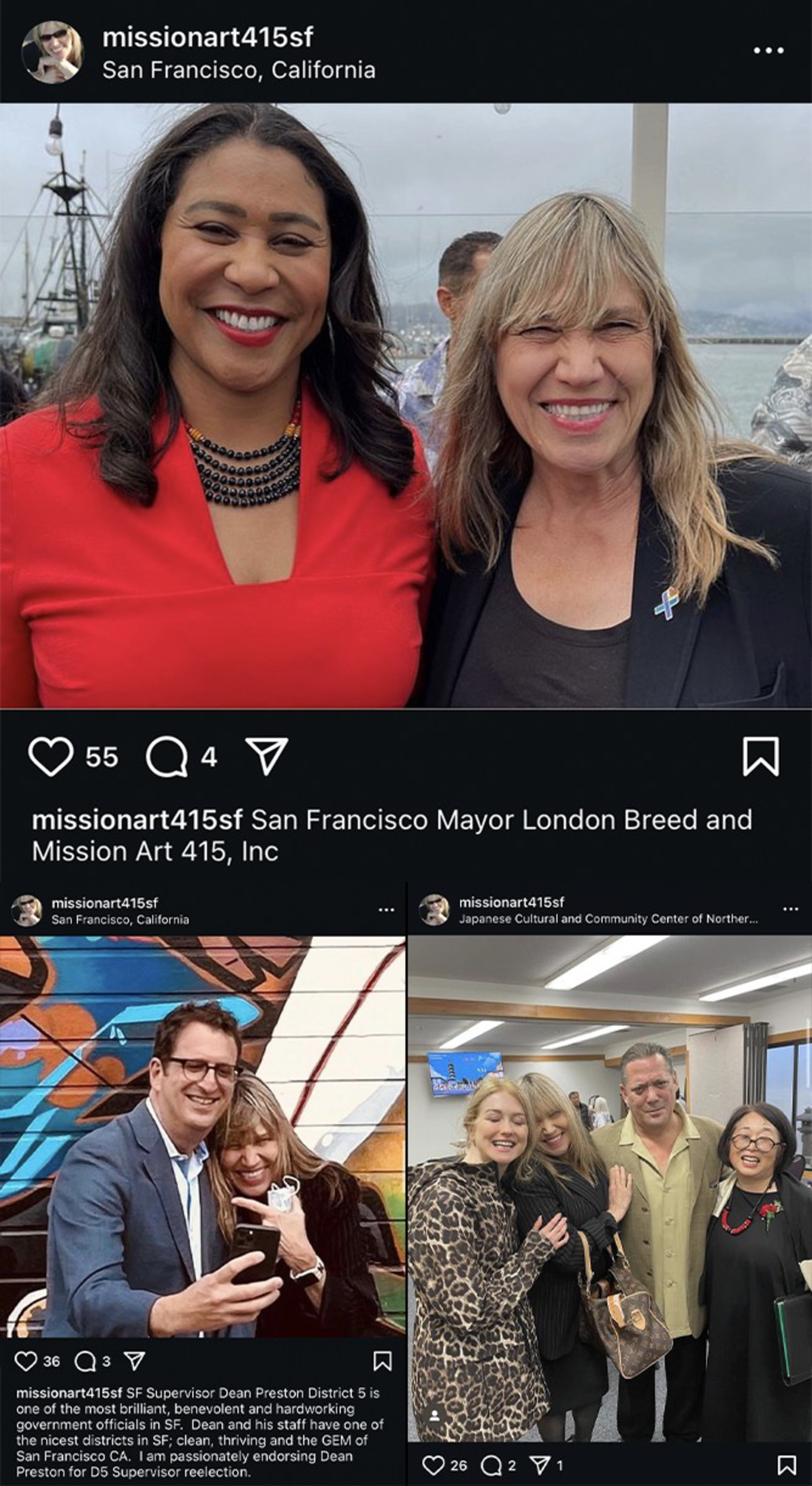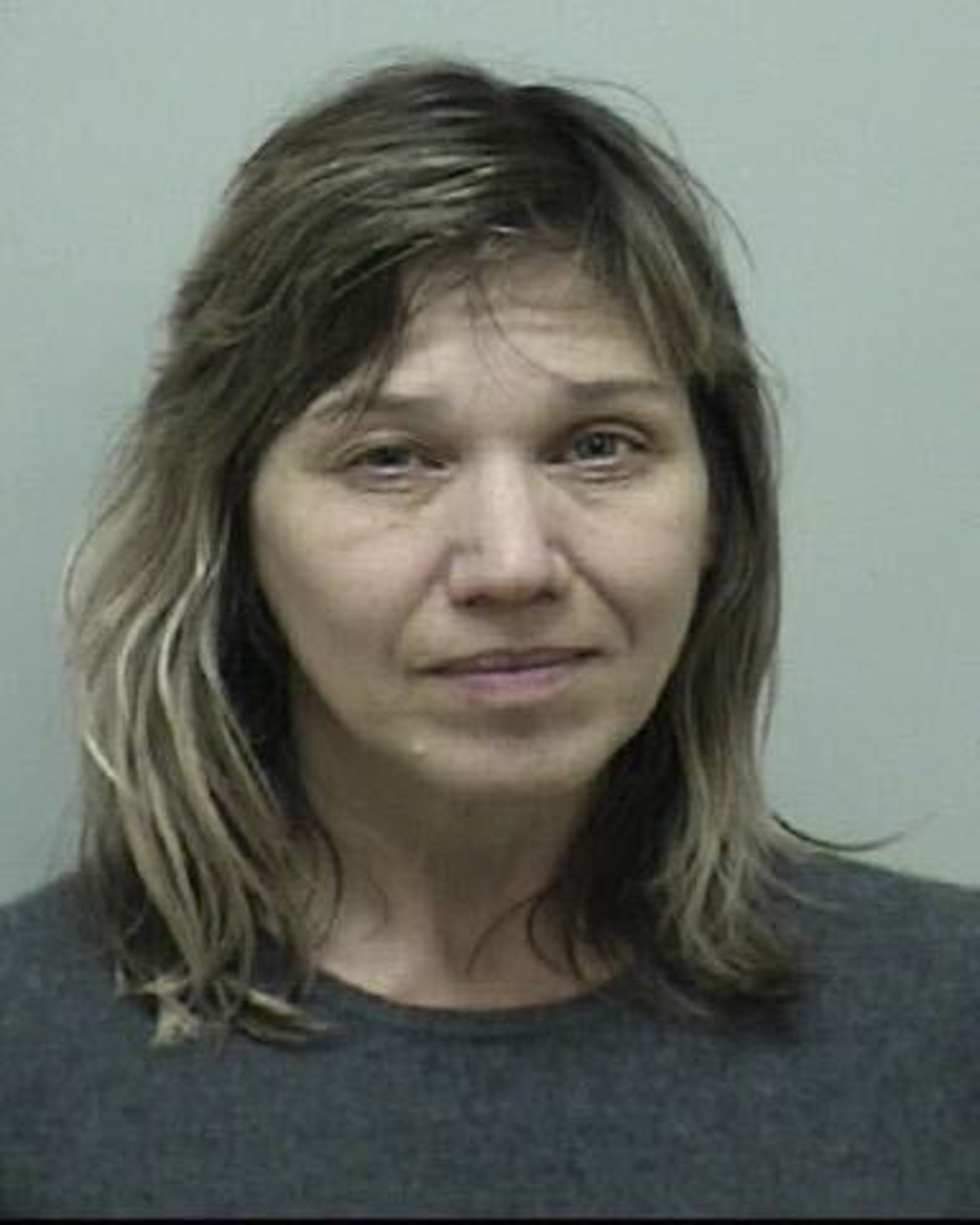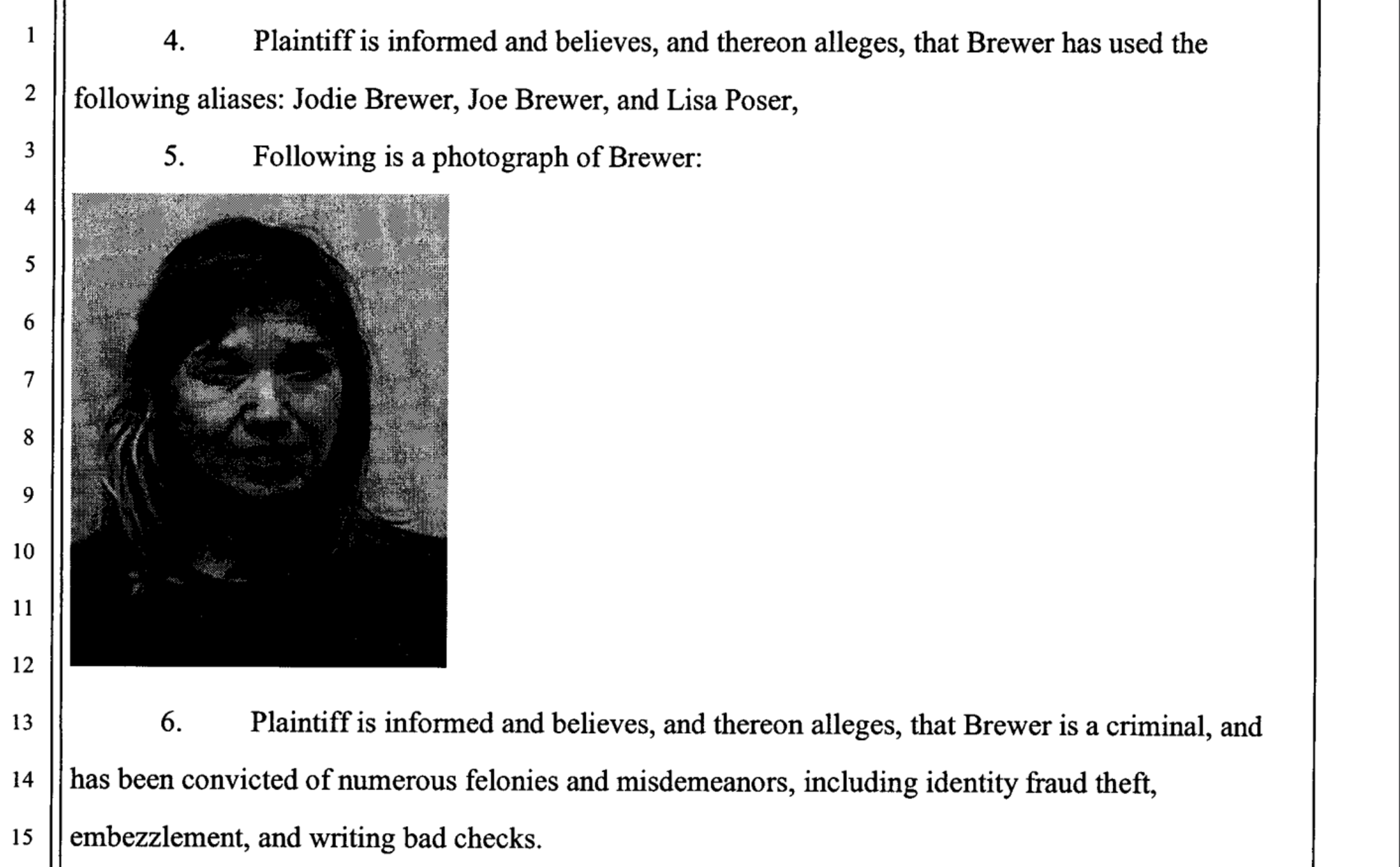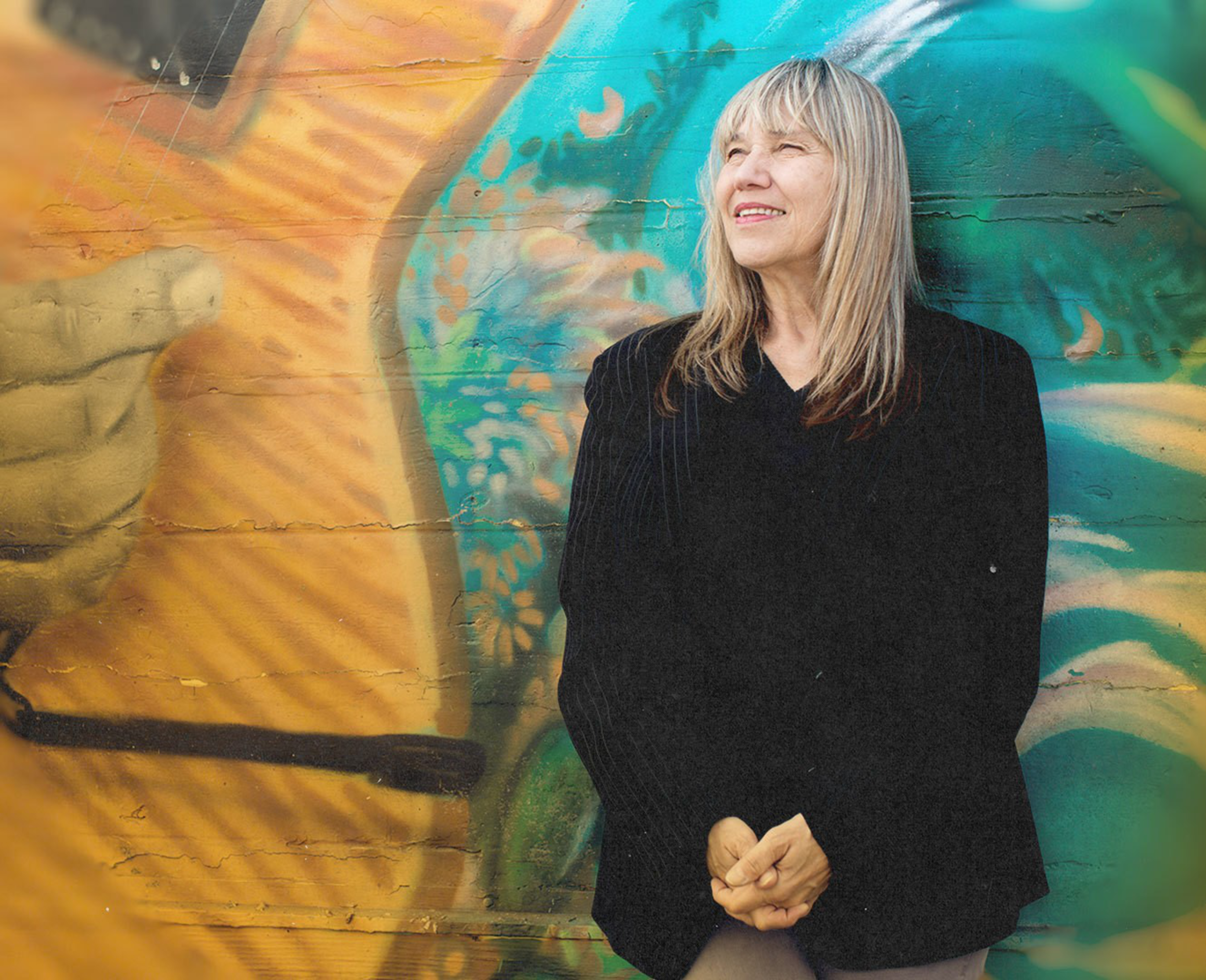In April, Outer Sunset resident Rosemary Omron’s savings account amounted to $50,000; by June, it was nearly empty.
For three years, the former kindergarten teacher has been working to kickstart her company iheartsf (opens in new tab)— an all-in-one street art and clothing brand accompanied by a podcast about “what’s made San Francisco beautiful.” Her longterm goal was to raise money to purchase old hotels and renovate them into transitional housing.
In March, Omron was having lunch at La Taqueria when she happened upon Mission Art 415, a colorful, closet-size nonprofit gallery across Mission Street, squeezed between a jewelry store and the Mission Cultural Center and festooned with kitschy-chic artwork: watercolor sunsets, heavily saturated prints of the Golden Gate Bridge, a black-and-white portrait of Hunter S. Thompson.
The gallery’s owner is Lisa Brewer, a 65-year-old with choppy blond bangs and a broad smile, who can often be seen in her signature pinstripe black suit at the unveiling of murals across the city. Brewer has made a name for herself as a power broker in San Francisco’s insular arts scene, acting as a liaison to name brands like Levi Strauss and Harley-Davidson, as well as countless established and up-and-coming artists just hoping to score paid commissions for murals and street projects.

Over the past 18 years, Brewer has been involved in the installation of dozens of murals across the city, connecting artists and community groups to city departments, business owners, nonprofit benefactors, and other deep-pocketed patrons. She has worked on mural projects with the likes of Mayor London Breed and District 5 Supervisor Dean Preston, the San Francisco Fire Department and the San Francisco Arts Commission, rock star Carlos Santana (opens in new tab), and the San Francisco Giants (opens in new tab). Hard-knuckle graffiti artists revere her, and she’s been lauded as an altruistic champion of public art.
But behind the cans of spray paint and incandescent street murals is another, long-buried side of Brewer, who in 2009 was convicted and sentenced to jail for embezzlement and fraud, owes tens of thousands in overdue taxes in four states, and has been sued successfully several times by individuals claiming she misallocated funds or failed to pay wages or rent.
The Standard spoke with artists, investors, and contractors who detailed business deals with Brewer that went awry. Other artists questioned the legitimacy of Brewer’s nonprofit gallery after bad experiences with payments, the existence of forgeries, and interactions with the founder that left them feeling deceived.
“Somehow, she’s been able to bury her past,” said Mike Lin, a Bayview resident who is still seeking $57,000 from a judgment he was awarded against Brewer in 2017 after she was found to be making false representations with intent to defraud. Lin’s suit alleged that Brewer’s gallery was a “shell” and that she treated its assets “as her own funds.”
“I don’t know how she can operate in the Mission as a nonprofit,” he told The Standard. “Maybe she did some things for the arts community. She’s a scammer, though, and she needs to be taken down.”

When they met this spring, Omron and Brewer bonded over their shared love of street art and graffiti, and the aspiring entrepreneur conveyed her vision of her company, which had been slow to get off the ground. Brewer, in turn, painted a pretty picture for Omron: The iheartsf logo would be plastered across murals all over San Francisco, plus she’d get a seat on the board of a future graffiti museum, connections to high-rolling investors, and celebrity guests for her podcast.
“I thought, ‘Holy shit, how amazing. If I can get my domain across her [murals], wouldn’t that be an amazing way to start my business?’” said Omron. “Well, I don’t know if she saw a sucker in me or what, but she said, ‘I want to help you.’”
Four months and $42,250 later, Omron has seen no murals adorned with her logo and has lost faith that she’ll ever see a return on her investment with Brewer, even after having her lawyer draft a letter demanding reimbursement. She fears that the city’s preeminent street-art broker has left her high and dry. And she’s learning she’s not alone.
A trail of red paint
Born in Pittsburgh and raised in rural Pennsylvania, Brewer has spoken of herself in interviews and billed herself in her email signature as an “international fine art broker” with ties to Dubai, Portugal, Russia, London, New York, Singapore, and Washington, D.C. After extensive searching, The Standard could not find evidence of these connections.
When asked to provide specific examples of her work with international clients, Brewer declined. “I really don’t want to pull anyone else into this nasty situation,” she said. “I don’t think it’s relevant.”
Brewer spent most of her life in various corners of the Northeast and the South until making her way to San Francisco in the early 2000s. Her account of her arrival in the city includes founding her gallery in 2006, while simultaneously working as chief financial officer for a pharmaceutical company in North Carolina. As she tells it, after a physical altercation with a colleague, she was accused of embezzling funds from the company.
'Holy shit, she’s still at it.'
Mike Lin, who successfully sued Brewer in 2017
In 2009, San Francisco police received notice from law enforcement in North Carolina that Brewer was wanted for arrest for crimes committed in 2006. She was extradited from San Francisco to North Carolina and convicted of two counts of identity theft, one count of obtaining property under false pretenses, and one count of embezzlement of more than $100,000.
She was sentenced to serve six to eight months in confinement and says she served six in a county jail. “I was in jail waiting for my fair day in court,” said Brewer. “It was a long time, but I was not going to take a plea bargain for something I didn’t do.”

Brewer was ordered to pay $117,000 to the state and $96,000 in a civil judgment. She now owes more than $277,000 to North Carolina due to accruing interest.
Brewer also owes nearly $50,000 in tax liens filed against her in North Carolina, Pennsylvania, Maryland, and California. In 2014, California’s Labor Commissioner ordered her to pay $11,000 to San Francisco resident Michael Lewis after he sued her and the Singaporean company that contracted her for failing to pay him overtime hourly wages.
Lewis (who is not the Berkeley-based author behind “Moneyball”) told The Standard he was never paid and recently renewed the judgment. Brewer claims to have no knowledge about the ruling, adding that she believed the onus was on her employer. “This is the first time I’ve ever heard about this,” she said.
The Standard spoke with nearly a dozen people in the San Francisco art community who’ve had direct dealings with Brewer. Several artists whose work has appeared in Brewer’s Mission Art 415 detailed examples of mismanagement at the gallery, noting inconsistent and irregular hours of operation and delayed payments. Though many were critical of her business affairs, others acknowledged Brewer’s contributions to San Francisco’s public arts, including the creation of Lilac Alley Mural Project in a once crime-ridden alley in the Mission, now covered in artwork and blossoming out to 14 surrounding blocks.
“The contribution she’s made to the arts scene in San Francisco is phenomenal,” said one person close to Brewer, who wished to remain anonymous out of fear of losing their job because of their connection. “She probably exaggerates from time to time, but you can say anyone is committing fraud these days. Lisa takes a lot of money from people, and then she delivers in unique ways. She’s always been good to artists and paid rent on time.”
In June, a San Francisco Superior Court Judge ordered Brewer to pay $15,000 to her landlord for unpaid rent from March 2020 until September 2021. Brewer said her business was closed for several months during the pandemic while still being asked to pay rent. She has not paid, according to Brewer, though she professed that her landlord “will actually get paid back.”

In 2021, Phoenix-based artist Geoffrey Gersten discovered that forgeries of one of his most successful pieces were being sold at Mission Art 415 gallery. Gersten contacted Brewer immediately, demanding that she destroy the forgeries and explain herself. Her explanation of how the work came to her gallery “grew legs and traveled the globe,” said Gersten.
The Standard reviewed text messages sent from Brewer to Gersten in which she attempted to explain her story, which allegedly involved another artist named “Geffory,” his representation, and someone who Brewer claimed was an employee of hers for 30 years that she fired.
“I remember telling her that the story was so ridiculous that I explicitly told her, ‘I don’t believe you. It’s clear on the phone that you’re lying to me.’ Every time I said that, she added something to the story and just kept making it bigger. It was like a Build-A-Bear story,” he said. The forgery “was a straight riff printed right off my website, and I told her, ‘If you do this again, I will sue you so hard, I will destroy you.’”
Brewer eventually sent two $600 money orders to Gersten, which were viewed by the Standard. Gersten said these payments were far less than what the art was worth; he said the same prints were being sold on his website for $2,000 apiece.
The Mission mural debacle
Though most of her disputed dealings with artists have remained relatively private affairs, there is at least one notorious public fumble on Brewer’s résumé. It came in 2016, in the heart of the Mission, when what was supposed to be a national meeting of graffiti artists and muralists devolved into a veritable street-art Fyre Festival (opens in new tab).
Brewer, the organizer, was forced to abruptly cancel the second annual Meeting of Styles Art Festival 2016 after the city denied permits at the last minute. Calle 24 Latino Cultural District, an organization in the Mission, had received complaints over the previous year’s disorganized execution, which resulted in the defacing of community murals.
For the 2016 festival, dozens of artists who had traveled to San Francisco from around the country showed up with no knowledge of the festival being canceled and were told to return home without the opportunity to put up their artwork (opens in new tab). “I feel violated,” New York street artist George Colon told El Tecolote in 2016 (opens in new tab). “It was a disaster.”
Brewer recruited Lin, the Bayview resident, as one of the festival’s investors. According to a lawsuit Lin later filed, he provided her with $27,000 in bridge loans to kickstart the festival and invested $30,000 to become a 40% owner of Brewer’s art gallery. After the festival flopped, Lin sued (opens in new tab), alleging fraud and Brewer’s use of several alter egos, including Jodie Brewer and Lisa Poser. Four months later, there was a judgment in his favor; Lin has a debt collector chasing her down, he said.
When The Standard spoke to Lin by phone, he said he’d been in the throes of a manic episode when Brewer first approached him and believes she took advantage.
“Holy shit, she’s still at it,” said Lin, when told of the allegations made against her by Omron. “I got scammed by a scam artist. I have bipolar disorder, and when you are manic, you have a tendency to trust people you shouldn’t trust, and that happened.”

Lin and Omron said they believe Brewer is using the money she takes from people to prop up her nonprofit gallery, which, according to data compiled by ProPublica, received donations totaling $188,700 from 2020 through 2022, the last year in which filings are available. These claims could not be confirmed by The Standard, but in June, the state’s franchise tax board suspended the nonprofit for filing errors.
Brewer said she does not deal with the finances of Mission Art 415 and directed questions to CFO Ed Valleau, who did not respond to several requests for comment.
Dubious donations
In late April, about a month after Omron first walked into Mission Art 415, Brewer asked her for $10,000 to include the iheartsf logo on two murals in the Tenderloin and Mission neighborhoods. The murals were set to be unveiled in July and September, respectively.
In a brief Aug. 20 phone call with The Standard, Brewer said both property owners had approved the murals, adding that she had “just got off the phone with the owners.”
However, when The Standard contacted the owners of the Tenderloin building, they said that not only was the mural not approved, but Brewer had approached them for the first time Aug. 21. Gloria Saucedo, owner of the Mission building, said Aug. 29 that Brewer approached her “about three weeks ago,” and that she approved the project. Brewer has announced that the mural will go up Oct. 18.
Brewer later said the Tenderloin property had been sold to another tenant. “We were going down with scaffolding, getting ready to prep the wall, when I found out that they sold the property, so we switched gears,” she told The Standard.
In May, Brewer drafted a contract asking Omron for $25,000 in consultation services that would provide marketing and sales services from sponsorships at festivals and a branding collaboration with Levi Strauss. Omron’s company would also become a subsidiary of Brewer’s nonprofit. In emails to Omron viewed by The Standand, Brewer name-dropped local celebrities, nonprofit owners, and artists as potential podcast hosts and rattled off sponsorship opportunities. Omron did not sign the contract but wired Brewer the $25,000.
“I wanted to let her know I was serious,” said Omron.
Weeks later, Brewer’s boyfriend Randolph Bowes — who was once arrested in Stevensville, Md. (opens in new tab), for attempting to spray-paint a chicken on the exterior wall of an Acme grocery store to “cheer up his mother” — offered to help Omron shoot a video introduction for her podcast. He later sent her an invoice for $7,250 for the work, claiming the 24-second video had taken 30 hours to produce. Omron said the couple insisted on her sending the money immediately “because they needed it to buy his mother an 80th birthday present because they were flying to Maryland the next day.”
Brewer said the video was actually three minutes long but could not provide a copy to The Standard.
“That’s pretty insane she was able to get away with that,” said Ben Dennis, an audio and video editor in the Bay Area, who reviewed the 24-second video and estimated that it should have taken one to two hours to edit. “The whole thing should have been $250.”
“It was a labor-intensive [project],” Brewer said when asked to justify the $7,250 charge. “It’s hard to work on something creative, and then it just falls apart. When [Omron] got uncomfortable, I just said, ‘Then don’t pay it.’”
After receiving the video, Omron started to feel uneasy about Brewer’s work and approached her about getting her money back. She said Brewer refused.
“I’m a little naive, but I’m not stupid,” Omron said. “I’m watching her work, and I’m starting to put things together. Her Rolodex of people are the same, her stories are the same, her words are the same. She is introducing me to people, but my business is not getting anywhere.”

Though her lawyer has sent Brewer a demand letter for the reimbursement of $42,250, Omron may not be legally owed the money because she failed to sign the contract. In any case, she has decided not to pursue further legal action.
“No point to it,” she said. “I want her to be judged in the court of public opinion. She’s not giving me a dime back — she’s made that clear.”
Controversy mounts in Japantown
Despite the legal issues that have trailed her for years, Brewer has maintained close relationships with a number of San Francisco community groups. Since 2022, she has been a pro bono advisor to the San Francisco Japanese American Citizen League, a nearly 100-year-old Japantown community group, which has been embroiled in a controversial effort to erect a 2,200-square-foot mural below Peace Plaza’s pagoda along Geary Boulevard.
If completed, the mural will be one of the largest and most expensive in San Francisco. The “Japantown Journey Mural” has been estimated to cost $312,000 — with $200,000 going toward two artists and $50,000 toward creating “technology and QR codes,” according to a budget on SF JACL’s website.
But the Japantown project has been mired in disagreements (opens in new tab) over the proposed subject matter and a perceived lack of input from portions of the community. Over the last two months, alarms over Brewer’s legal history and checkered past (opens in new tab) have been raised at community meetings, according to attendees. One SF JACL board member has resigned, finances are being reshuffled, and community debate has grown — as has division.
In a statement this month, the SF JACL said it rejects complaints over the partnership with Brewer. The local organization’s president, Judy Hamaguchi, said Brewer has consulted for free for more than two years and added that the current budget is not final. “Her current work in the Mission and in the city says more about her than her past,” said Hamaguchi.
The group has invested $100,000, bequeathed by late members, in the project and must raise a considerable amount more to ensure the mural is completed.
Brewer says her track record and the community goodwill she’s engendered fly in the face of her detractors.
“No good deed goes unpunished, right?” she said. “If you’re in business for 20 years and you work with thousands of people, you best believe there’s going to be 10% that don’t like you. You would have infinitely more people saying that I feed them, I help them, I maintain projects that they’re involved with.”
She said that in spite of the allegations, she believes her contributions to the city will stand the test of time.
